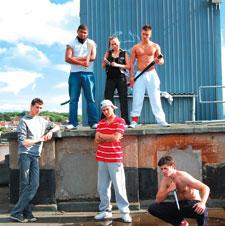What’s the deal with British men?
Fifty years ago, Saturday Night and Sunday Morning, the 1960 film adaptation of British author Alan Sillitoe’s novel about a depressed blue-collar worker, started the Angry Young Man movement in British cinema. Then 10 years later A Clockwork Orange had to be banned in the United Kingdom because it was making a whole new generation of angry young men break things and hurt people.
Now, three decades later, from this land of angry young men comes Shank.
Set in Bristol, England where Banksy’s graffiti artwork of a death’s head has permanently replaced the “have a nice day” smiley face, the men are angrier than they’ve ever been.
Being angry young men of the post-Stonewall era they are, of course, angriest about the existence of the Happy Young Fag. And they spend their days calling each other fags and bashing gay men.
What they don’t know, however, is that gang member Cal is having anonymous sex with some of the gay men they bash.
Our story begins with one of Cal’s hook-ups. Parked in a secluded area of the woods, Cal shares his cocaine, mouth and ass with the stranger — all the while telling him to capture the action with his cellphone. When the man dares to ask for a second date Cal goes Ultimate Fight Club on him, leaving him bloodied, disbelieving and looking for answers as to how such a perfect date could end so badly. Back home Cal uploads the cellphone footage to his computer and watches in hot, disgusted disbelief over how he spent his afternoon.
When Cal suddenly defends and befriends one of the guys his group is bashing (a soft-spoken student in a bright pink shirt named Olivier) he has to confront his repressed gay feelings. Meanwhile Cal’s previous hook-up, who also happens to be Olivier’s professor, is slowly figuring out the identity of his student’s new boyfriend.
Intellectually masturbating over his own victimhood — the professor blames Cal’s violence toward him on the popular academic theories of desensitized and disenfranchised youth — he comes to the sad summation familiar to any gay elder in search of younger: he tells himself that Cal was a welcome, dangerous “distraction from my shitty existence.”
Complicating matters is Cal’s gang. Will Cal be brave enough to stand up to them and own his queer desire? Or will Cal be the next gay they bash?
“One of the incidents we based the story on was this young girl in Bristol who was the leader of a gang who beat up this 17-year-old French student who was on his way to a local gay cruising ground,” says Shank’s producer and co-writer, Christian Martin, over the phone from England. He says the movie is based on so many stories that no one talks about, especially youth. “They go out, go to clubs and they get pissed and they [go home with] some young guy and they think it’s all free and easy. But it isn’t. Because they’re walking out of that club and they’re still getting beaten up,” Martin observes.
Watching a gay basher work through his self-loathing while living in the UK where, according to a Seinfeld episode, all men just seem to act gay, is a really unique movie going experience.
Even better, Shank is gutsy enough — remember we’re talking about England here — to have a sunbathing Olivier ask Cal to rub suntan lotion on his young, pasty white back.
And forget about all the nudity and did-they-or-didn’t-they eye-popping sex scenes in Shank (of which there are plenty); what you’ll be replaying in your head is blowback scene with Cal and his hunkiest bud, Jonno — one sharing a lungful of marijuana with the other by leaning in ever so close to him and exhaling the smoke into his open mouth.
Interestingly, the biggest controversy about Shank isn’t its sex, the violence, the fact that its director is only 21-years-old, or that it was refused by Britain’s version of Out On Screen. Shank’s lightning bolt is the effeminate Olivier character, which Martin wanted as a flip side to the macho Jonno.
“[Jonno’s] a stereotype [audiences] can cope with,” he notes, “while for gay men [Olivier’s] the stereotype they don’t want to be.”

 Why you can trust Xtra
Why you can trust Xtra


